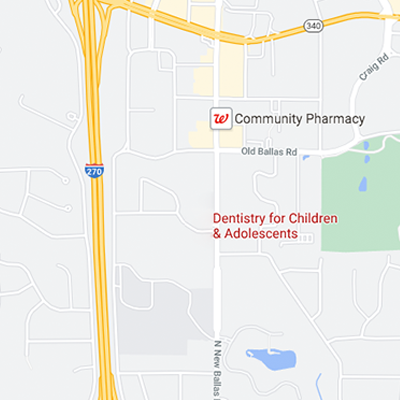February 25th, 2026

Dental veneers are a popular treatment to improve the appearance of your smile. Dr. Varble, Dr. Dill, and Dr. Wong and our team want to help you understand whether this dental option is right for you.
Veneers, also known as laminates, are custom-made shells that cover the front of your teeth. They can change the color, size, or length of each individual tooth. The process can require between one and three trips to our Creve Coeur or St. Charles office to complete.
This treatment is usually done for people who want to change the appearance of their smile: they can get rid of stains, gaps, or chips. Here at Dentistry for Children, we know how getting veneers can dramatically change your smile and help improve your confidence.
Your initial appointment entails preparing the teeth and creating an impression. The impression will help us design each veneer to the exact shape and color you desire. You’ll come back in a week or two to have the veneers placed. Your veneers should last about ten years, as long as you practice proper care and hygiene.
There are plenty of benefits to getting veneers, but you should be aware of the potential downsides of this procedure. This process is irreversible and the veneers cannot usually be fixed. If they chip or crack, they’ll need to be replaced.
It is also possible for veneers to fall off due to excessive pressure from nail biting or chewing on ice. If you grind your teeth a lot, you’re more likely to expose your veneers to damage, which can be costly to repair.
In order to know whether veneers are right for you, schedule an appointment at our Creve Coeur or St. Charles office for a consultation. We can decide what you’re looking to do with your smile and if this is the best option for you.
February 18th, 2026

Are you looking to improve the appearance of your front teeth? Dental veneers are widely used to improve the appearance of front teeth and are a much more conservative option than a full dental crown. Veneers can be used to improve the appearance of staining, large gaps, large fillings, chipped teeth, or overall shape. Veneers are a thin covering over the front and biting end of the tooth used to restore the beauty of a smile. Over the years we have helped many patients who opted for veneers and now have the confidence to smile again.
Dental veneers are made in a lab from long-lasting porcelain materials. The shade can be chosen to a desirable color to whiten the appearance of your smile. Dental veneers are usually placed on the anterior, or front teeth, where the chewing forces are not as hard as the back teeth. The process of placing veneers is relatively easy requiring only two dental appointments. In some cases, only one appointment is needed. It depends on the fabrication process.
The first appointment is to “prep” the teeth and take an impression to be sent to a lab to fabricate the veneers. Veneers are fairly conservative in the preparation as it requires a small amount of space to be created on the face (front), bottom, and sides of each tooth to allow space for the veneer to be placed and look natural. You will leave the office with temporary veneers for the next week or two while the permanent veneers are being made.
The second appointment is to place the veneers and make minor adjustments if needed. What a difference it makes in the appearance of the teeth! If you’re interested in learning more, give Dr. Varble, Dr. Dill, and Dr. Wong a call today!
February 11th, 2026

When we think of Valentine’s Day, we think of cards, flowers, and chocolates. We think of girlfriends celebrating being single together and couples celebrating their relationship. We think of all things pink and red taking over every pharmacy and grocery store imaginable. But what Dr. Varble, Dr. Dill, and Dr. Wong and our team would like to think of is when and how this joyous, love-filled day began.
Several martyrs’ stories are associated with the origins of Valentine’s Day. One of the most widely known suggests that Valentine was a Roman priest who went against the law at a time when marriage had been banned for young men. He continued to perform marriage ceremonies for young lovers in secret and when he was discovered, he was sentenced to death.
Another tale claims that Valentine was killed for helping Christians escape from Roman prisons. Yet another says that Valentine himself sent the first valentine when he fell in love with a girl and sent her a letter and signed it, “From your Valentine.”
Other claims suggest that it all began when Geoffrey Chaucer, an Englishman often referred to as the father of English literature, wrote a poem that was the first to connect St. Valentine to romance. From there, it evolved into a day when lovers would express their feelings for each other. Cue the flowers, sweets, and cards!
Regardless of where the holiday came from, these stories all have one thing in common: They celebrate the love we are capable of as human beings. And though that’s largely in a romantic spirit these days, it doesn’t have to be. You could celebrate love for a sister, a friend, a parent, even a pet.
We hope all our patients know how much we love them! Wishing you all a very happy Valentine’s Day from the team at Dentistry for Children!
February 4th, 2026

It’s the littlest month of the year, so what better time to think about the dental health of our littlest family members? February is National Children’s Dental Health Month, and we’re here to suggest some of the best dental habits for healthy childhood smiles.
Babies
- Even before your baby cuts her first adorable tooth, you can start proactive dental care by gently wiping little gums with a clean, moist gauze pad or soft cloth twice a day. This removes bacteria and food particles and helps prepare your baby for brushing.
- When that first tooth does appear, or by age one if it hasn’t yet erupted, it’s time to schedule a visit to the dentist. At this first visit, your child’s dentist will check jaw and tooth development and can give expert guidance on teething, brushing, how much and which kind of toothpaste to use, and topics like thumb-sucking and pacifier use.
- When baby teeth arrive, use a small soft-bristled toothbrush designed to fit comfortably in tiny mouths.
- Use toothpaste as recommended. Children under the age of three who use paste should use a very small amount, no larger than a grain of rice.
- Prevent “baby bottle tooth decay”—don’t put your baby to bed with a bottle. This allows the sugars in formula or, when your child is 12 months or older, milk, to bathe the teeth throughout the night. And babies and toddlers never need sugary juices or sodas in those bottles!
Toddlers
- Help your child develop a positive relationship with his dental team. Read books or watch videos to help your child learn what to expect. Practice with him by having him open his mouth while you count his teeth. Plan visits when your child isn’t hungry or tired. Be positive yourself—your child will take his cues from you!
- Schedule regular appointments for exams and cleanings. Dr. Varble, Dr. Dill, and Dr. Wong will check tooth and jaw development, look for any signs of decay, and evaluate potential problems such as prolonged thumb sucking or pacifier use.
- By age three, children have most or all of their baby teeth. Use a soft bristled brush to clean your child’s teeth twice each day. As she grows, demonstrate how to brush properly. The dental team at Dentistry for Children will have some great ideas on technique!
- Daily flossing should begin as soon as your child has two teeth which touch.
- Around age six, your child may be transitioning to solo brushing and flossing—but your oversight is still needed. Make sure all the surfaces of the teeth, including the tops of new molars, are brushed thoroughly. You might provide a timer or a two-minute song or video to make sure your child spends enough time brushing. Flossing can be tricky for young hands, so you’ll need to help with that task for a few years more.
School-Aged Children
- Dentists and orthodontists recommend a first visit to the orthodontist by age seven, or earlier if you notice your child has trouble chewing or biting, if the teeth don’t seem to fit together properly, or if you have any concerns about bite and alignment. When potential problems are discovered right away, early intervention can prevent more serious orthodontic issues from developing later. The team at Dentistry for Children in Creve Coeur or St. Charles is happy to answer any questions you might have about early interventions!
- Talk to Dr. Varble, Dr. Dill, and Dr. Wong about sealants. Permanent molars usually erupt between the ages of 6 and 12. Sealants are thin coatings which protect the chewing surfaces of these molars from food particles and cavity-causing bacteria which would otherwise collect inside grooves in the enamel.
- Children who play sports and engage in activities with a chance of physical contact should have a well-fitted mouthguard to protect their teeth. Be ready to replace it as often as recommended by Dr. Varble, Dr. Dill, and Dr. Wong or if it’s damaged.
- Increases in hormones during puberty can lead to puberty gingivitis, and swollen, red, and bleeding gums can be the result. Proactive dental hygiene will prevent gum disease from developing. Make sure your child brushes two minutes, twice a day, and flosses once per day. If symptoms persist, it’s time to see the dentist.
- If your child is beginning orthodontic treatment, you can help make the journey easier. Keep up with appointments and adjustments, look for toothbrushes and floss designed for braces, and provide braces-friendly foods. If your child wears bands or aligners, you may need to remind her to wear them for the recommended number of hours each day.
- A nutritious diet is essential for healthy teeth and gums. Give your child solid nutritional building blocks with a diet rich in proteins, vitamins, and minerals.
Help your child enjoy a future of healthy, confident smiles by working in partnership with your child’s dental team. They are ready every month of the year with advice and expertise to make that healthy dental future a reality!






